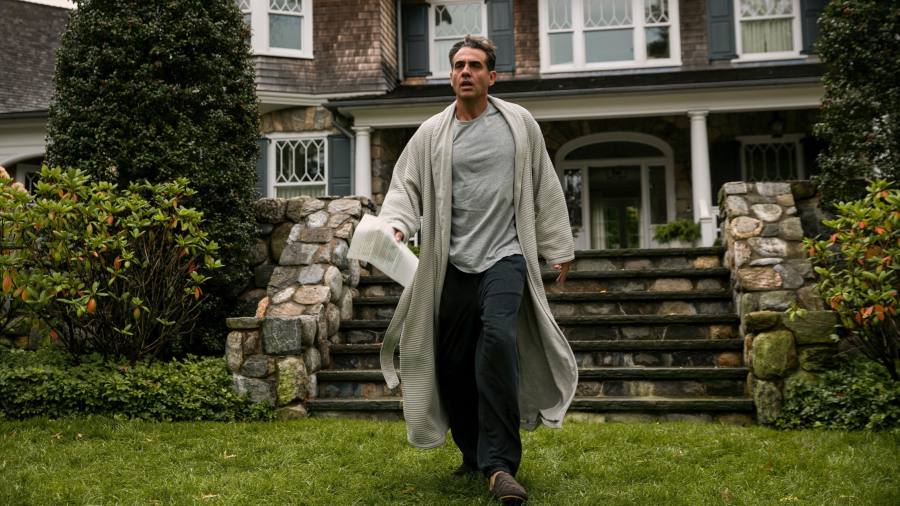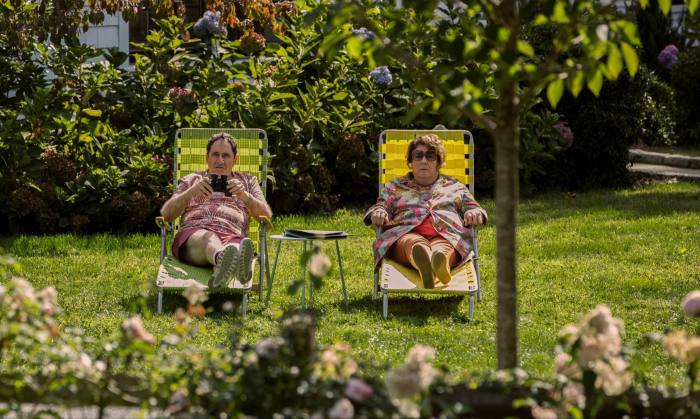
The first thriller everyone is talking about is The Watcher. New to Netflix, it is a dramatisation of the real-life story of Derek and Maria Broaddus, who, in 2014, bought a dream suburban home out in Westfield, New Jersey.
Wood-clad, Dutch barn roof, lawns down to the sidewalk, it seemed picture perfect, a place to raise wholesome kids. Only it wasn’t. The couple were haunted out of their own property by a series of anonymous letters from someone stalking it, them and their children. Who wrote them?
There’s a second thriller here, too: the housing market itself. Will it end with blood on the floor? In particular, for the leafy suburbs and commuter towns that filled up with city refugees fleeing the pandemic?
There’s not much to do in the ’burbs in the evenings, as they may now be discovering. Turn on a Netflix drama or watch the news from behind the sofa as it announces the latest mortgage rates, inflation numbers and electricity prices. A housing market crash is predicted. Negative equity stalks the shadows.
The Watcher is not a great thriller. The plot is implausible and the characters are cartoonish. Reviews are justifiably mediocre: this newspaper could only spare it two stars. But as a satire, it hits the mark.
The family in The Watcher are the Brannocks. Their biographies differ from the real-life Broaddus family. Dean and Nora Brannock are a lawyer and a potter who’ve escaped a New York apartment for the good life in New Jersey, a place they’d hoped would inoculate them from the anxieties of the city. You know the sort.
Letters are sent, telling them they are being watched. Dead ferrets appear on an upstairs landing and there’s some weirdo hiding in the house’s dumb waiter.
But the real horror, at least for a city dweller, is that the neighbours just won’t leave them alone. One couple insist they own the arugula growing on the Brannock side of the fence. Pearl, from the local preservation society, played by Mia Farrow in plaits, won’t get off their lawn.
The pandemic was the spur for many to find a better house, preferably detached and somewhere salubrious, and certainly out of the filthy city. Manhattan lost 7 per cent of its residents while Jersey and Connecticut boomed and, in Italy, Milan’s population thinned as Italians returned to their southern villages. In central London, some flat prices plunged by double digits while country homes were snapped up.
Not every move worked out. A British tabloid published the story of a woman who’d moved to Surrey, within commuting distance from London. It was read widely and with relish. Her dream quickly soured. The Aga was lovely and warm, the neighbours less so. The augur of an eviscerated deer carcass appeared on her lawn one morning. By episode two of The Watcher, Nora is already on the “I’m starting to miss New York” jag.
I wonder whether comments about the show posted on discussion platforms such as Reddit are from steadfast city dwellers and the original suburb and country dwellers who have had to put up with the vanities of newcomers — all code for “they deserved it”. (Though spare a thought here for the real-life Broaddus family, who were profoundly affected.) The posters’ whodunnit theories are as much about the crime of an overheated housing market as the letter-writing itself.

Was it Karen, the estate agent, who takes a cut from every successive family in the property? They sell in desperation, without wanting to mention the “problem” with the property. She takes her commission and brings in the next round of chumps. (Every countryside estate agent must know that chocolate box properties easily become structural nightmares, but that’s not their problem.)
Or Dean himself? He has hocked the family savings to get the mortgage in desperation to buy this $3.2mn New Jersey house. (A hoofed-up price — it was $1.35mn in real life.) His vanity extends to wanting to rip out a perfectly good Carrara marble kitchen because it doesn’t suit his cooking. But he realises he’s overextended and needs a way out. It is difficult to admit expensive mistakes. Those large country houses bought during the pandemic sure take a lot of heating oil.
There is a metaphysical take too: any house has its own spirit that will overtake its occupants. In the case of this New Jersey home, it was that the house was the dream, picture perfect, in a good neighbourhood, where you could raise wholesome kids and become wholesome yourself again.
But it alters its inhabitants in an unexpected way. Having bought the dream, the paranoia that you might lose it to exogenous forces — the local madman, bankers, vicious economic downturns — overtakes you. Security cameras are installed everywhere.
The greatest fear, though, is that you may have been a fool and that your old city neighbours are laughing at you.
Follow Joy @joy_lo_dico
Find out about our latest stories first — follow @FTProperty on Twitter or @ft_houseandhome on Instagram